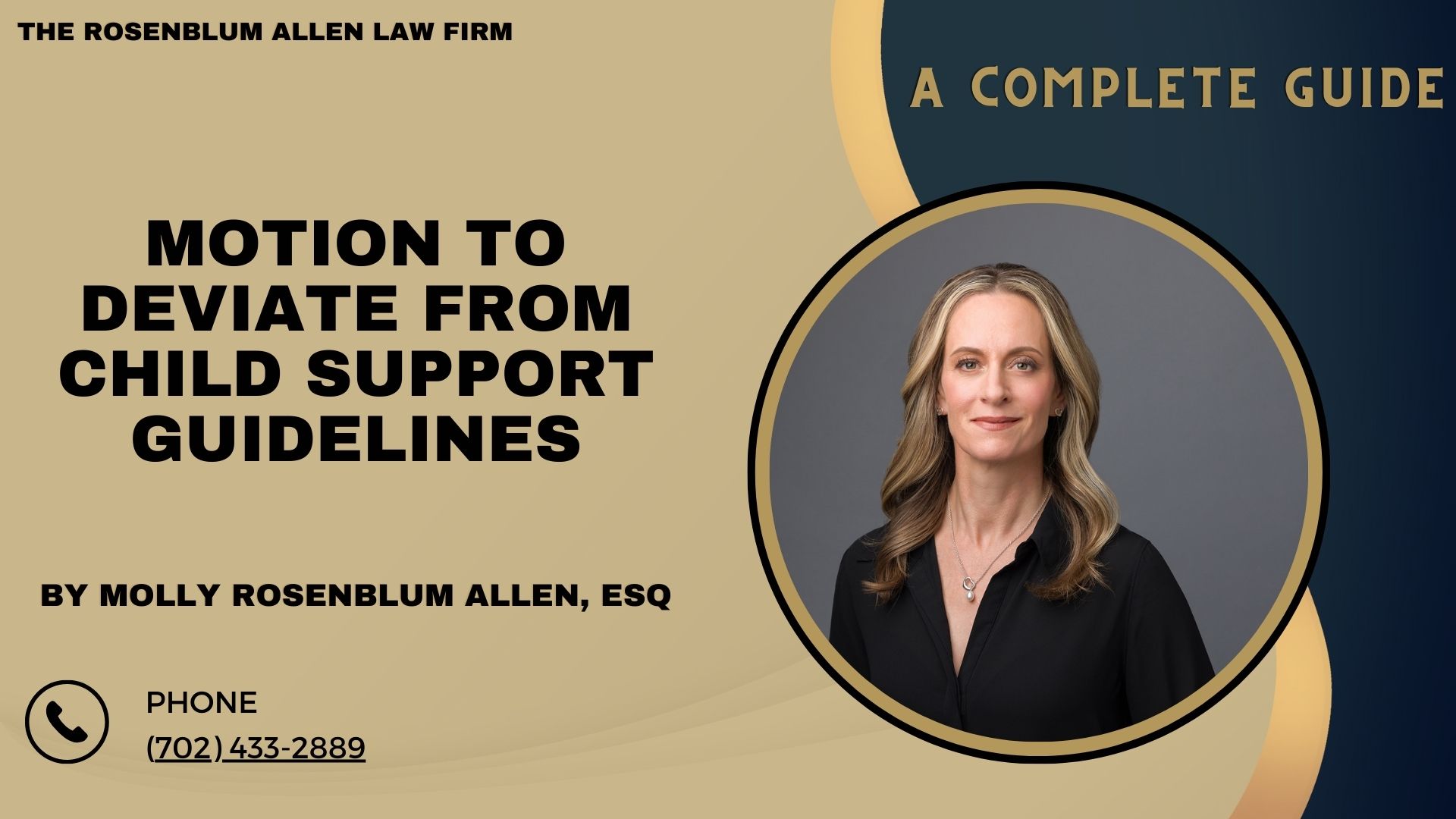The state’s child support guidelines ensure meeting the child’s financial needs. They do so fairly and consistently. But, life is not one-size-fits-all. There are times when following these rules may not be best for the child or the parents. This is where a motion to deviate from child support guidelines comes into play. It’s a legal pathway for parents. They believe their situation warrants a different approach to child support. Consider it a formal request to the court asking, “Can we do things a bit differently for our child?”

Understanding Child Support Guidelines
The bedrock of child support is the guidelines set by the state. The guidelines are for the child’s welfare. They aim to give a stable money base. This is true no matter the parents’ relationship.
The Purpose of Child Support Guidelines
At their core, child support guidelines have two aims. They ensure that children get the financial support they need and deserve. They also standardize the calculation of this support to prevent unfair treatment. These guidelines show what it typically costs to raise a child. They also show how the state will split that cost between parents based on their finances.”
How Child Support Amounts are Calculated
Factors considered in standard calculations
When it comes to crunching the numbers, several factors come into play, including:
Each parent’s income
The number of children involved
Health insurance costs
Childcare expenses
Any special needs the child may have
This calculation balances the child’s needs with the parent’s ability to pay. It creates fair financial responsibility that reflects both parties’ economic situations.
The role of state-specific guidelines
It’s important to remember that child support is not a one-size-fits-all scenario. Each state has its own guidelines. Variations in how support is calculated and allocated result from this. These differences mean that understanding your state’s rules is crucial. They are key to estimating child support accurately.

The Basis for Deviation
So, what if the standard formula doesn’t fit your situation? The law knows that life is complex and hard to calculate. That’s where the motion to deviate comes in.
Legal grounds for deviation
A few common reasons might force a court to deviate from the guidelines.
High income of the non-custodial parent: If the income is significantly higher than the guidelines account for, a deviation may be warranted to ensure the child’s lifestyle is consistent with both parents’ financial status.
Special needs of the child: Children with special needs may require additional financial support for medical care, therapy, or specialized education, which can justify a deviation.
Shared custody arrangements: When both parents share custody and spend an equal amount of time with the child, the standard calculation might not accurately reflect each parent’s financial contribution.
The Importance of Demonstrating the need for Deviation
It’s not enough to want a deviation; you must prove it’s necessary. This means providing clear evidence. It should show that your situation is outside the norm. Following the standard rules would not be in the child’s best interest.

Preparing to File
Preparation is vital When considering a deviation from child support guidelines. You’ll need to gather many documents. They should justify why the standard rules shouldn’t apply to your case. Here’s what to focus on:
Gathering Necessary Documentation: Start with financial statements, medical records of the child, proof of income, and any other documents that support your claim. If your child has special needs or has extraordinary expenses, ensure these are well documented.
Understanding Your State’s Legal Forms: Each state has its forms and procedures for filing a motion to deviate from child support guidelines. Familiarize yourself with these forms. Many can be found online on your state court’s website. Visiting the courthouse can also provide valuable resources and clarification.

The Process of Filing
Filing the motion requires attention to detail and adherence to legal procedures. Let’s break it down:
Where to File: This will usually be in the family court where your original child support order was issued. The courthouse can direct you to the correct division if you need clarification.
Required Documentation: Along with your motion, you must file the documents you gathered during preparation. This might include a financial affidavit, evidence of your child’s unique needs, or proof of a change in your financial situation.

After Filing the Motion
What to Expect During the Hearing
After you’ve filed your motion, the next big step is the hearing. This is where you’ll present your case to a judge. Here’s a sneak peek into what that might look like:
Presenting Evidence: You’ll need to show the documents and evidence that support your request to deviate from the standard child support guidelines. Be prepared to explain each piece of evidence and how it relates to your child’s needs or changes in financial circumstances.
Legal Arguments for Deviation: This is your moment to make a compelling argument for why the standard guidelines should not apply to your case. Whether it’s because of a significant change in income, the unique needs of your child, or another valid reason, be clear and concise in your explanation.
Potential Outcomes
The hearing can conclude in a few different ways:
Approval of the Motion: If your argument and evidence convince the judge, your motion to deviate may be approved. This could result in a new child support order that better reflects your current situation.
Denial and Its Implications: If the motion is denied, you’ll be expected to continue adhering to the original child support order. Understanding why your request was rejected is essential, as this can provide insight into whether an appeal or a future modification might be successful.

Challenges and Considerations
Navigating a motion to deviate from child support guidelines is challenging. Here’s what you might face along the way:
Common Challenges in Seeking Deviation
Proving a Substantial Change in Circumstances: One of the biggest challenges is demonstrating a significant change since the last child support order. This requires solid evidence and a clear explanation.
Contesting Objections from the Other Parent: The other parent may object to the deviation, necessitating a robust and evidence-backed argument to support your case.
Strategies for Success
To overcome these challenges, consider the following strategies:
Legal Representation and Advice: Consulting with a legal professional who understands the intricacies of family law in your state can provide a significant advantage. They can help prepare your case, gather evidence, and represent you during the hearing.
Clear and Compelling Evidence: The quality of your evidence can make or break your case. Ensure all documentation is organized and relevant and supports your request for deviation.

Modifications and Appeals
Requesting Modifications to an Existing Deviation
Life is unpredictable. Your circumstances can change and require a modification of the child support agreement. Here’s how you might navigate this:
Circumstances That Warrant Modification: Significant changes such as a job loss, a substantial increase or decrease in income, or a change in the child’s needs can all be reasons to request a modification of your child support order.
The Process for Requesting a Modification: Similar to filing a motion to deviate, you’ll need to gather evidence of the changed circumstances and file a motion for modification. This usually involves completing specific forms and submitting them to the same court that issued the original child support order.
Appealing a Decision
If the court denies your motion to deviate or request to change, you might consider an appeal. Here’s a brief overview:
Grounds for Appeal: An appeal is typically based on the argument that the court made a legal error in its decision. This could involve misinterpreting the law, misapplying it to your case, or overlooking crucial evidence.
The Appellate Process: Filing an appeal involves different procedures and deadlines. You’ll need to submit a notice of appeal and a detailed brief arguing your case. Since appeals focus on legal errors rather than new evidence, the strength of your original documentation and arguments is crucial.

Breaking It All Down
Navigating child support is complex. This is especially true when seeking to deviate from the standard rules. You might be preparing to file a motion or going through a hearing. You might be facing challenges or thinking about an appeal. In all these situations, staying informed and prepared is key.
Remember, this journey is not just about laws. It’s about ensuring your child’s well-being in changing times. Legal representation is invaluable. It offers guidance and advocacy to help you navigate these challenges. Always put your child’s best interests first. Do so in your actions and decisions.
This guide aims to provide a full understanding of the process. It explains what to expect when seeking to deviate from child support guidelines. Each step needs care and prep. It’s essential to start with a clear mind and organized documents. Remember, you’re not alone; resources are available to help you through this process.

Frequently Asked Questions
How can I get legal assistance if I can’t afford a lawyer for my motion to deviate from child support guidelines?
If you’re facing financial constraints, consider reaching out to local legal aid organizations or self-help centers in your family court. They often provide free or low-cost services to eligible individuals.
What is the typical timeframe for a decision on a motion to deviate from child support guidelines?
The duration can vary based on factors like court schedules and case complexity. Generally, it may take several weeks to a few months from filing the motion to receiving a decision.
Is it possible for a deviation in child support guidelines to be retroactive?
Courts may allow retroactive adjustments in some cases, especially if there’s been a significant delay in the hearing or if the change occurred well before filing the motion. However, retroactivity isn’t guaranteed and often depends on state laws and judicial discretion.
What happens if the other parent disagrees with the deviation?
If the other parent opposes the deviation, they can present their arguments and evidence during the hearing. The court will consider both sides before making a decision. It’s essential to provide strong evidence to justify the deviation.
Are there any potential risks associated with filing a motion to deviate from child support guidelines?
One risk is that the court may deny the motion and reassess your financial situation, potentially resulting in an increased child support obligation. Consulting with a legal professional beforehand can help mitigate such risks.
How frequently can I request a modification to my child support order?
While there’s no strict limit on the frequency of modification requests, courts typically look for significant changes in circumstances since the last order was issued. Filing multiple requests without substantial new evidence or changes may not be favorable.
Can deviations from child support guidelines impact other aspects of my divorce agreement, such as custody arrangements?
While the motion primarily focuses on child support, changes in financial circumstances could indirectly affect custody arrangements, especially if they impact your ability to provide for your child.
What happens if I relocate to another state after a deviation is approved?
Child support orders, including deviations, are enforceable across state lines under the Uniform Interstate Family Support Act (UIFSA). However, you may need to register the order in the new state if either parent relocates. This ensures the order can be enforced or modified as necessary.
Is it possible to reach a settlement for a deviation request outside of court?
Yes, if both parents can agree on a child support arrangement that deviates from the guidelines but serves the child’s best interests, they can submit their agreement to the court for approval. The court will review the agreement to ensure it meets legal standards and adequately addresses the child’s needs.

Glossary
Child Support Guidelines: The legal framework determines how much financial support a non-custodial parent must provide for their child’s upbringing.
Motion to Deviate: A formal request submitted to a court seeking permission to diverge from the established child support guidelines based on specific circumstances.
Financial Affidavit: A document that provides a detailed account of a person’s income, expenses, assets, and liabilities, used in legal proceedings to assess monetary standing.
Special Needs of the Child: Considerations for children who require additional support due to physical, emotional, developmental, or educational needs.
Shared Custody Arrangements: A parenting agreement in which parents share legal and physical custody of their child, impacting child support calculations.
Substantial Change in Circumstances: A significant alteration in either parent’s or child’s financial or living situation warrants reevaluating child support orders.
Evidence: Documentation or testimony presented in court to support or refute a claim, such as income statements, medical records, or educational expenses.
Legal Representation: The act of being advised and represented by a lawyer in legal matters, providing expertise and guidance throughout the legal process.
Appeal: A formal request to a higher court to review and change the decision of a lower court based on the argument that the initial decision was incorrect due to legal error.
Modification: An adjustment to an existing court order, such as child support, due to changes in circumstances or new information.
Appellate Process: The sequence of steps in challenging a court’s decision, including filing a notice of appeal, submitting briefs, and possibly oral arguments.

Additional Resources for You
To further assist you in your time of need, our lead attorney, Molly Rosenblum Allen, Esq., has created a suite of valuable resources. These guides and services are designed to provide in-depth assistance across a range of family law matters. Whether you’re navigating the complexities of family court in Las Vegas, considering a name change, or exploring adoption in Nevada, we’re here to help. Below is a list of these resources, complete with links for easy access:
Las Vegas Family Law Attorneys: A comprehensive guide to family law services offered by our firm, from divorce to custody arrangements. Find out more.
Family Court Las Vegas: Essential information and guidance on navigating the family court system in Las Vegas. Learn more.
Common Law Marriage in Nevada: An exploration of common law marriage laws in Nevada and how they might affect you. Discover the details.
Name Change Las Vegas: Step-by-step assistance for individuals looking to legally change their name in Las Vegas. Get started.
Nevada Power of Attorney: Guidance on establishing a power of attorney in Nevada, covering the legalities and necessary steps. Explore your options.
How to File a Motion in Family Court: A practical guide for those needing to file a motion in family court, including tips and procedures. Read more.
Family Court Mediation: Insights into the mediation process within the family court, offering a path to resolving disputes amicably. Understand the process.
Unbundled Attorney: Information on unbundled legal services, providing flexible and affordable legal assistance tailored to your specific needs. Learn about unbundled services.
Nevada Adoption: A guide to the adoption process in Nevada, offering support and advice for those looking to expand their family. Find out how.

Outside Resources for You
American Bar Association (ABA): A premier source for legal education, resources, and standards in the legal profession. Visit ABA
National Association of Family Law Attorneys (NAFLA): Provides insights and support for family law matters, including divorce and child custody. Visit NAFLA
FindLaw for Families: Offers free resources on family law, divorce, child support, and custody issues. Visit FindLaw for Families
Avvo: An extensive directory of lawyers where you can also ask legal questions and receive answers from attorneys. Visit Avvo
Nolo: Provides a broad range of free legal articles, including step-by-step guidance on family law matters. Visit Nolo
Justia: Offers free access to a wide range of legal resources, including case law, statutes, and legal guides. Visit Justia
The National Domestic Violence Hotline: Provides crucial support and resources for those experiencing domestic violence, a critical aspect to consider in family law matters. Visit The National Domestic Violence Hotline

A Special Message from Our Lead Attorney, Molly Rosenblum Allen, Esq

Dear Reader,
Thank you so much for taking the time to explore the resources we’ve provided. I hope you’ve found them insightful and helpful as you navigate your legal journey. We understand that every situation is unique. While these resources offer a lot of information, personalized legal advice is irreplaceable.
At The Rosenblum Allen Law Firm, we’re dedicated to giving you the help and guidance you need. They will help you make informed decisions about your case. You may be facing family law issues. You might be considering a name change. Or, you may need help with any other legal matter. We’re here to help.
I invite you to call me and my team at (702) 433-2889 to discuss your situation further. Together, we can work towards achieving the best possible outcome for you and your loved ones.
Warm regards,
Molly Rosenblum Allen, Esq.




